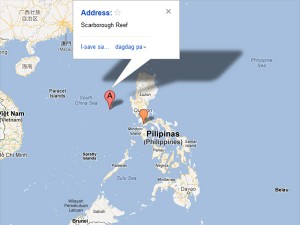PH Panatag claim a recent one–Chinese exec
MANILA, Philippines—A ranking Chinese government official has disparaged Manila’s claim to the disputed Panatag (Scarborough) Shoal, saying that it was a recent concoction that had no place in contemporary times.
“Huangyan Island (China’s name for the shoal) has always belonged to China. It is not even included in the Philippine territory on the latest official map published by the Philippines. The 21st century should not be a time to proclaim new territory. If such new acts of territorial encroachment were condoned, the result would be chaotic,” said Fu Ying, vice minister at the Ministry of Foreign Affairs of the People’s Republic of China, in an article published in The Straits Times on Friday.
The Chinese Embassy in Manila e-mailed a copy of the article, titled “East Asia’s cooperative security,” to members of the media.
Fu, a former ambassador to the Philippines, added that “China still expects to solve disputes with the Philippines through consultation and is making endeavors to this end.”
Relations between the two countries worsened after Chinese ships blocked Philippine vessels that were out to arrest Chinese fishermen in the West Philippines Sea (South China Sea) in April.
Both countries deployed vessels near the disputed Scarborough Shoal for more than a month to press their conflicting claims to the area.
China claims the shoal along with most of the South China Sea, even up to the coasts of its Asian neighbors, while the Philippines claims the shoal as being well within its 200-nautical-mile exclusive economic zone.
Since then, China has impounded Philippine fruit shipments and warned tourists against visiting the Philippines, while Manila has charged that Beijing is sending even more ships to the shoal.
Fu also said that the dialogue among defense officials, experts and scholars from Asia Pacific countries being held in Singapore “to discuss and reflect on how to build lasting security in East Asia” (See related story on Page A1) had greatly helped China.
“At a larger level, this dialogue has helped China to explore with Asean countries a new approach to security, at the heart of which are equality and cooperation. That is why it can be called cooperative security,” he said.
He said that China was committed to fostering partnerships with all countries.
“We don’t believe in making enemies, alliances or targeting third parties. We faithfully fulfill our international role and obligations. We also signed up to the declaration of conduct of parties in the South China Sea for peace and stability in the region,” he said.
He said China’s security objectives in the Asia Pacific included China’s own stability and prosperity, peace and stability in the neighboring areas, and dialogue and cooperation with other Asia Pacific countries.
“This was proposed in the first meeting of the Asean Regional Forum in 1994 and has remained true till today,” he said.
He added that as a major developing country, China faced complex security challenges. “It is only natural that China should seek to strengthen its defensive capabilities. A China confident in its ability to defend itself is conducive to peace and stability in the Asia Pacific,” he said.
For comprehensive coverage, in-depth analysis, visit our special page for West Philippine Sea updates. Stay informed with articles, videos, and expert opinions.
